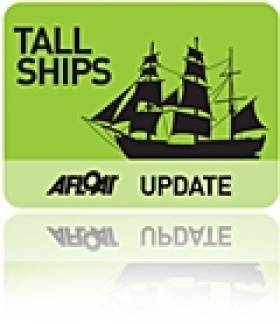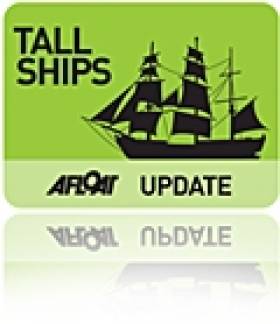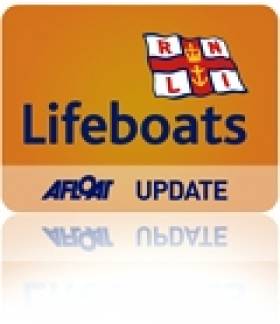Displaying items by tag: ocean youth trust
Support for Ocean Youth Trust Ireland
#tallships – Ocean Youth Trust Ireland was recently presented with a cheque for £4,100.00 towards their work with young people throughout Ireland. The presentation was made by Mrs Janet Leckey, Trustee of the Lloyds TSB Foundation for Northern Ireland when she visited the organisation recently. Mrs Janet Leckey said:
"The Lloyds TSB Foundation for Northern Ireland is delighted to be able to support the work of Ocean Youth Trust Ireland. The money will be used towards the 'Sail to Success' project, which will deliver a diversionary five day camp to young people in July. We wish the organisation continuing success with their excellent work, supporting young people at risk within the community".
Bronagh Cappa-Campbell, Chief Executive of Ocean Youth Trust Ireland said:
"Ocean Youth Trust Ireland is delighted to receive this very generous donation from Lloyds TSB Foundation for Northern Ireland. It will greatly benefit our young people and communities and we are looking forward to working with them to enable them to access sailing and adventure and thereby enhancing their personal development and future prospects".
Lloyds TSB Foundation for Northern Ireland awards between £1.5 and £2 million annually in support of the Northern Ireland Community to enable people, especially disadvantaged or people with special needs, to play a fuller role in their community.
Ocean Youth Trust Ireland has developed a full programme of sailing and camp opportunities for young people, adults, schools and youth based organisations that to date has included try sailing in July & August at Lough Foyle, Derry/Londonderry as part of the Clipper Homecoming Festival, in Galway in July for the Volvo Ocean Race and sailing and coaching for residents and visitors to the Inishmore Aran Islands in July. During August and September the Trust are delivering daily sailing to youth based organisations and to the general public in Belfast and Castlewellan Forest Park where there is also the opportunity to book a residential sailing adventure. The Trust has also been at the forefront of providing twenty eight young people from across Ireland with the once in a lifetime opportunity to be a part of the crew on board the Tall Ship – the Pelican of London for a three city ten day voyage from Dublin to Liverpool and back to Belfast as well as to be a part of the two Tall Ships festival.
There is something for everyone aged twelve years upwards this Summer with Ocean Youth Trust Ireland. No sailing experience is necessary. All safety gear and insurance is provided plus sailing instruction that is delivered by fully qualified sailing instructors. For details on all sailing and adventure camp opportunities visit www.oyti.org.
Ocean Youth Trust Ireland was granted the Inspire Mark by the London Organising Committee of the Olympic Games and Paralympic Games. The Inspire mark is the badge of the London 2012 Inspire programme - a UK-wide participation initiative which recognises innovative and exceptional non-commercial projects which are inspired by the 2012 Games. The Department of Culture, Arts and Leisure is responsible for delivering the Inspire programme in Northern Ireland, as part of its wider strategy to create a local legacy from the 2012 Games'.
Ocean Youth Trust 'Reviews Procedures' in Wake of Lord Rank Sinking
Following the sinking of Ocean Youth Trust's (OYT) Lord Rank on June 8th and the UK's Marine Accident Investigation Board's subsequent examination, OYT has taken 'a number of actions to ensure the future safe operation' of its vessels. This includes 'a review of its procedures and their implementation on board', according to an MAIB report HERE.
The report says The Lord Rank was engaged in a charity fund-raising event last June 8 and was scheduled to call at a number of Northern Ireland ports. The vessel completed her fund-raising activities at Ballycastle and departed port at 2100 with three crew and three passengers on board. The next port of call was Portrush, a passage of about 3 hours under power. No passage planning was undertaken. On clearing the breakwater, the skipper ordered the helmsman to head in a northerly direction. About 10 minutes later he ordered the helmsman to alter course to port and head towards a visual reference point. No further position monitoring was undertaken. The vessel went aground on Carrickmannanon Rock at about 2123. The skipper then broadcast a 'PAN PAN' message on VHF radio that was acknowledged by the Coastguard. A rescue operation involving a helicopter, an inshore lifeboat and an all weather lifeboat ensured that the crew and passengers were landed safely ashore. STV Lord Rank subsequently sank.
The Marine Accident Investigation Branch (MAIB) examines and investigates all types of marine accidents to or on board UK ships worldwide, and other ships in UK territorial waters.
The Chief Inspector of Marine Accidents has written to Ocean Youth Trust Ireland emphasising that 'professional standards need to be maintained at all times'.
The OYT's agm will be held at Balyholme Yacht Club in Bangor, Northern Ireland on October 18th at 7pm.
The Ocean Youth Trust has issued a statement regarding the sinking of their only sail training vessel, the 70-foot ketch the Lord Rank.
Bronagh Cappa, Chief Executive of the trust, said:
“The Ocean Youth Trust is greatly saddened by the loss of our only vessel, the Lord Rank, but is delighted that none of the six people aboard were injured during what was a textbook evacuation.
“The Lord Rank, a 68ft Oyster ketch crewed by a fully-qualified skipper, first mate and crewman, had a perfect safety record over 19 years at sea with the Ocean Youth Trust, working with tens of thousands of young people around Ireland.
“Around 10 o’clock last night the vessel hit rocks at a particularly treacherous part of the North Antrim Coast. The RNLI and Coastguard responded promptly and the crew and three passengers were safely taken off by dinghy.
“The Lord Rank sank around 4am during a salvage attempt.
“An investigation is underway into the circumstances of the incident and we cannot comment further until that is concluded. However, we are relieved and delighted that all involved emerged completely unscathed.”
Ocean Youth Trust Yacht Lord Rank Sinks off Antrim Coast
The Ocean Youth Trust sail training yacht the Lord Rank sank this morning after hitting rocks off Ballycastle in Co Antrim. Six persons were rescued from the 70-foot ketch in a rescue operation that took just under four hours.
The six, including three Downtown radio presenters, were rescued by lifeboat crews on Tuesday night after hitting rocks near Ballycastle. Those involved were all taking part in a charity fundraiser on board the Lord Rank when the boat ran aground off Kinbane Head shortly after 2200 BST.Downtown Radio was broadcasting from the boat as part of the charity campaign. The six were landed at Ballycastle with no injuries. The Sligo based Irish Coast Guard helicopter also responded to the callout.
Five of the group were taken off the yacht by the Portrush RNLI lifeboat, which launched its Y boat to recover them. The Red Bay RNLI Atlantic inshore lifeboat took the sixth person off before transferring them to the Portrush lifeboat, which then brought them in to Ballycastle.
Paddy McLaughlin, Red Bay RNLI helm said, “ Both Red Bay and Portrush RNLI lifeboats responded to the callout. Our priority was to get everyone off the stranded vessel as quickly as possible as it had hit rocks and the damage to the vessel was not known. That area has a strong tide and we wanted to ensure the safety of the skipper and the five passengers.”The vessel sank a few hours later.
The Lord Rank was Ireland's only operational sail training vessel of any size since the Asgard II sank off the coast of France in 2008.
The BBC article on the sinking is HERE, while the RNLI report of the incident is HERE.



























































